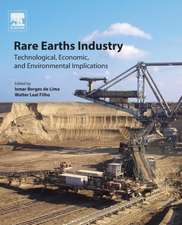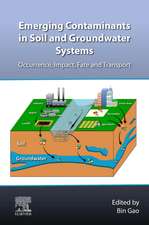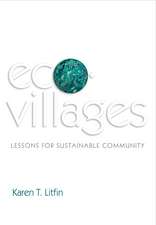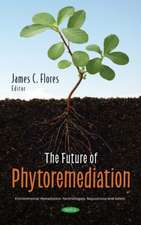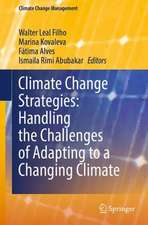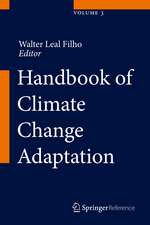Handbook of Climate Change Across the Food Supply Chain: Climate Change Management
Editat de Walter Leal Filho, Ilija Djekic, Sergiy Smetana, Marina Kovalevaen Limba Engleză Hardback – 23 apr 2022
On the other side, temperature changes and variations of precipitation patterns, together with extreme weather events and water reduction, are recognized as predictors for producing less food, decreased food quality, new food safety risks, biodiversity losses, and depletion of resources associated with food production in modified circumstances. Last but not least, these effects introduce new threats known as food security where some assumptions stress that almost one billion of people are hungry not receiving enough food as a result of climate changes. As a result, the UN highlights the need for combating climate change and promotes sustainable (food) consumption and production.
Based on the perceived need to promote and disseminate information on climate change related to food system, the “Handbook of Climate change across the food supply chain” is being produced. The publication compiles information, experiences, practical initiatives, and projects around the subject matter and makes it available to a wide audience. It is expected that the “Handbook of Climate change across the food supply chain” makes many benefits of climate service clearer and, inter alia, leads to an increase in the demand for such important services.
| Toate formatele și edițiile | Preț | Express |
|---|---|---|
| Paperback (1) | 1008.91 lei 6-8 săpt. | |
| Springer International Publishing – 23 apr 2023 | 1008.91 lei 6-8 săpt. | |
| Hardback (1) | 1015.23 lei 6-8 săpt. | |
| Springer International Publishing – 23 apr 2022 | 1015.23 lei 6-8 săpt. |
Din seria Climate Change Management
- 20%
 Preț: 879.69 lei
Preț: 879.69 lei - 18%
 Preț: 956.81 lei
Preț: 956.81 lei - 9%
 Preț: 974.60 lei
Preț: 974.60 lei -
 Preț: 393.13 lei
Preț: 393.13 lei - 15%
 Preț: 640.88 lei
Preț: 640.88 lei - 5%
 Preț: 733.41 lei
Preț: 733.41 lei - 18%
 Preț: 1125.23 lei
Preț: 1125.23 lei - 15%
 Preț: 648.24 lei
Preț: 648.24 lei - 18%
 Preț: 958.25 lei
Preț: 958.25 lei - 24%
 Preț: 817.18 lei
Preț: 817.18 lei - 18%
 Preț: 1113.39 lei
Preț: 1113.39 lei - 18%
 Preț: 1123.19 lei
Preț: 1123.19 lei - 15%
 Preț: 654.77 lei
Preț: 654.77 lei - 18%
 Preț: 969.13 lei
Preț: 969.13 lei - 15%
 Preț: 652.64 lei
Preț: 652.64 lei - 15%
 Preț: 644.30 lei
Preț: 644.30 lei - 15%
 Preț: 651.99 lei
Preț: 651.99 lei - 18%
 Preț: 942.63 lei
Preț: 942.63 lei - 24%
 Preț: 851.59 lei
Preț: 851.59 lei - 18%
 Preț: 953.97 lei
Preț: 953.97 lei - 18%
 Preț: 1120.81 lei
Preț: 1120.81 lei - 18%
 Preț: 962.66 lei
Preț: 962.66 lei - 18%
 Preț: 1242.52 lei
Preț: 1242.52 lei - 15%
 Preț: 653.98 lei
Preț: 653.98 lei - 24%
 Preț: 858.45 lei
Preț: 858.45 lei - 15%
 Preț: 651.84 lei
Preț: 651.84 lei - 18%
 Preț: 895.58 lei
Preț: 895.58 lei - 18%
 Preț: 958.73 lei
Preț: 958.73 lei - 18%
 Preț: 1248.68 lei
Preț: 1248.68 lei - 18%
 Preț: 1228.96 lei
Preț: 1228.96 lei - 18%
 Preț: 945.92 lei
Preț: 945.92 lei - 18%
 Preț: 1245.66 lei
Preț: 1245.66 lei - 18%
 Preț: 792.66 lei
Preț: 792.66 lei - 18%
 Preț: 949.73 lei
Preț: 949.73 lei - 18%
 Preț: 1227.99 lei
Preț: 1227.99 lei
Preț: 1015.23 lei
Preț vechi: 1238.10 lei
-18% Nou
Puncte Express: 1523
Preț estimativ în valută:
194.29€ • 202.09$ • 160.40£
194.29€ • 202.09$ • 160.40£
Carte tipărită la comandă
Livrare economică 15-29 aprilie
Preluare comenzi: 021 569.72.76
Specificații
ISBN-13: 9783030879334
ISBN-10: 303087933X
Pagini: 489
Ilustrații: XV, 489 p. 98 illus., 86 illus. in color.
Dimensiuni: 155 x 235 mm
Greutate: 0.89 kg
Ediția:1st ed. 2022
Editura: Springer International Publishing
Colecția Springer
Seria Climate Change Management
Locul publicării:Cham, Switzerland
ISBN-10: 303087933X
Pagini: 489
Ilustrații: XV, 489 p. 98 illus., 86 illus. in color.
Dimensiuni: 155 x 235 mm
Greutate: 0.89 kg
Ediția:1st ed. 2022
Editura: Springer International Publishing
Colecția Springer
Seria Climate Change Management
Locul publicării:Cham, Switzerland
Cuprins
Climate Change and Food Production Aspects.- Global Climate Agreements and Policy translation in the Brazilian Agriculture: more of the same.- The Journey of Darjeeling Tea Gardens over Decades in the Eyes of the Satellite.- A New Diet: News on Food Habits and Climate Change.- Perspectives and limitations of urban agriculture in transition economies: A case study in Bosnia and Herzegovina.
Textul de pe ultima copertă
This book presents climate change as a global phenomenon which affects the entire food chain. Many studies analyzing environmental impacts of food systems confirm significant effects of food production on climate change. Most of them associate primary production with emission of greenhouse gasses identified as one of the causes resulting in warming the atmosphere and global climate effects. A wider perspective shows that the food chains start at farms with consumers being at the end of the pipeline. This approach emphasizes the role of the entire food chain highlighting different kinds of environmental impacts affecting climate change.
On the other side, temperature changes and variations of precipitation patterns, together with extreme weather events and water reduction, are recognized as predictors for producing less food, decreased food quality, new food safety risks, biodiversity losses, and depletion of resources associated with food production in modified circumstances. Last but not least, these effects introduce new threats known as food security where some assumptions stress that almost one billion of people are hungry not receiving enough food as a result of climate changes. As a result, the UN highlights the need for combating climate change and promotes sustainable (food) consumption and production.
Based on the perceived need to promote and disseminate information on climate change related to food system, the “Handbook of Climate change across the food supply chain” is being produced. The publication compiles information, experiences, practical initiatives, and projects around the subject matter and makes it available to a wide audience. It is expected that the “Handbook of Climate change across the food supply chain” makes many benefits of climate service clearer and, inter alia, leads to an increase in the demand for such important services.
On the other side, temperature changes and variations of precipitation patterns, together with extreme weather events and water reduction, are recognized as predictors for producing less food, decreased food quality, new food safety risks, biodiversity losses, and depletion of resources associated with food production in modified circumstances. Last but not least, these effects introduce new threats known as food security where some assumptions stress that almost one billion of people are hungry not receiving enough food as a result of climate changes. As a result, the UN highlights the need for combating climate change and promotes sustainable (food) consumption and production.
Based on the perceived need to promote and disseminate information on climate change related to food system, the “Handbook of Climate change across the food supply chain” is being produced. The publication compiles information, experiences, practical initiatives, and projects around the subject matter and makes it available to a wide audience. It is expected that the “Handbook of Climate change across the food supply chain” makes many benefits of climate service clearer and, inter alia, leads to an increase in the demand for such important services.
Caracteristici
Describes innovation on climate change and food production in a comprehensive way Provides a sound basis to promote efforts in the field of food production under a changing climate Fills in a market niche, being a comprehensive publication on the topic

